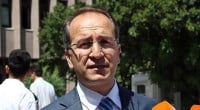Academic freedom at universities under growing threat

Date posted: May 5, 2014
ANKARA
Özsoy was under contract with the university until 2016 and no reason was provided for his removal. Oddly, the decision was made by the university’s chairman of the board of visitors, who has no such authority, rather than the university administration.
In January, the university administration cut Özsoy’s salary by 25 percent in an effort to discourage him from making comments on democracy and freedoms via social networks and the media.
Mansur Topçuoğlu, the chairman of the board of visitors, was among those who were under consideration to be the Justice and Development Party (AK Party) mayoral candidate for the Şişli district prior to the March local elections.
However, Özsoy is not the only academic who was recently given notice for condemnation of the political authority’s oppressive reaction to any segment of society that has questioned the legitimacy of the government after the exposure of the corruption scandal.
Professor Sinan Artan was also dismissed from Haliç University. The Higher Education Board (YÖK) removed him from his post in 2012 and the university fired him, but he was reinstated by a court order that said the university’s decision was unlawful. However, the university ignored the court order and Topçuoğlu instructed the security guards to forcibly remove Artan from the university.
Speaking to Sunday’s Zaman, Özsoy said he views the decision to fire him as an obvious political move, as well as groundless and unfair, and announced that he would not accept it. He said that if need be, he would teach his students on the street, adding, “If the decision to fire me was made in an effort to appease the political authority, then I consider the move to be persecution in terms of academic freedom.” Özsoy did, in fact, give his lecture on the street outside Haliç University on April 29.
Özsoy told Sunday’s Zaman that the university administration felt uneasy about statements he made on TV programs and Twitter after the Dec. 17 corruption scandal broke and he emphasized that his lawyers had initiated legal action to protest the decision. “In this atmosphere where universal principles of the law are violated by the government, and the president [Abdullah Gül] was even partly included in the process, we will continue our struggle to serve as a model for the public in claiming one’s rights,” he added.
When asked about his opinions that had apparently displeased the government, Özsoy responded that the government is not only not open to criticism, is not satisfied unless its wrongdoings are praised.
“For example, Süleyman Yaşar, a former columnist at the Sabah daily who has a broad vision regarding the economic policy of the current government, was fired from the outlet for not criticizing the Hizmet movement [the faith-based organization inspired by Turkish Islamic scholar Fethullah Gülen] on the grounds that the movement has damaged the economy by opposing the government. I underlined in my columns and messages on Twitter that the current unlawful order cannot be sustained in the face of graft claims. I think that by discharging me they were sending me the message that this lawless order will be maintained quite well,” Özsoy said.
‘Banning academics from expressing their opinions is reminiscent of N. Korea’
Calling attention to a recent amendment that allows disciplinary action for comments made to the media about political issues, Özsoy stressed that instructing academics about the scope of their speech and ideas is reminiscent of the oppressive regimes of North Korea and Saddam Hussein’s Iraq.
Criticizing the political authority for pushing to employ pro-government people in the private sector as well the public sector and not to employ those who do not pay sufficient homage to the government, Özsoy stated that he believed that there are special units in the government being used to keep track of individuals and state institutions in order to ensure whatever may be necessary is done with regard to those who do not share or who oppose the authority’s political vision. In addition to the recently approved National Intelligence Organization (MİT) law, which granted extraordinary powers to the organization, such as wiretapping people without a court order, he noted that these tools facilitate the government’s efforts to follow such dissident voices more easily.
When asked about whether a mechanism might be created within the state for others to report on those who take an anti-government approach, Özsoy replied, “It is a main characteristic of oppressive regimes. Such regimes intend to divide and separate out the ones whose support they seek. However, it is also a known fact that the first to be sacrificed in a revolution are those that initiate it.”
A professor of history and an opposition Nationalist Movement Party (MHP) deputy, Yusuf Halaçoğlu, also remarked on the government’s intolerance toward those who have adopted a more critical position of the government’s practices since the Dec. 17 probe, saying that no idea that opposes the government is currently allowed.
Speaking to Sunday’s Zaman, Halaçoğlu stated that voices raised against the government are being silenced by putting pressure on universities and the media, adding, “Those academics who try to point out the wrongdoings of the ruling party are punished by YÖK beginning disciplinary proceedings against them. How can anyone claim that democracy exists in an atmosphere in which scientists, journalists and politicians are constantly being silenced. This is an obvious violation of the freedom of expression and the principles of scientific freedom.”
Stating that despite the fact that the qualifications for positions at universities are explicitly defined in YÖK’s directive, Halaçoğlu said that many academics who are judged to be eligible for assignments are denied positions.
“Academics who met the criteria to be assigned to positions at universities are kept waiting without being given a valid reason. Then, instead of hiring them, YÖK makes other assignments, creating an unfair situation,” Halaçoğlu said.
YÖK prohibits academics from speaking to media after Dec. 17 scandal
Soon after the Dec. 17 corruption scandal became public, among other oppressive measures taken by the government, YÖK announced that disciplinary measures for speaking to the press had been added to the regulations and that disciplinary action would be imposed on academics who violate the regulations.
According to the recent amendment to the disciplinary regulations for administrators of higher education institutions, instructors and public servants working at those institutions will receive an official reprimand for speaking or providing statements on institutional issues to members of the press, with the exception of academic discussions, if they were not authorized to speak publicly.
Thus, the government has implemented another means to deter and silence academics who try to point out the corruption allegations or the ethical problems that it created in the political process.
Gezi Park protests used as pretext to fire two academics
In the latest fallout of last summer’s Gezi protests against the government’s redevelopment plan for a park in central İstanbul, two academics, Figen Algül and Can Özbaşaran, were dismissed from İstanbul’s Marmara University Faculty of Communication in March for having joined the protests last June.
However, because the decision came soon after the December 17 scandal, it would seem to support claims that the government had decided to eliminate opponents at universities.
The university administration allegedly launched an investigation of students and academics who were believed to have taken part in the Gezi Park protests. Upon the conclusion of the administrative inquiry into claims that Algül and Özbaşaran did not attend lectures because they had complied with a call to strike issued by the Confederation of Public Sector Trade Unions (KESK) in early June, the administration ruled to fire them.
Eight other academics at Marmara University are subject to a two-year promotion ban for their participation in the Gezi Park protests.
Dicle University rector accused of being member of ‘parallel structure’
The AK Party has been trying to distract the public’s attention from major allegations of corruption by holding an imagined “parallel structure” responsible for anything that makes the government look bad.
Dicle University Rector Ayşegül Jale Saraç was targeted by the AK Party through accusations of being a member of the so-called “parallel structure.”
Earlier this month, AK Party Diyarbakır deputy Cuma İçten accused Saraç and the administration of Dicle University of acting on behalf of the “parallel structure.” He claimed that this “parallel structure” is very influential at the university and that the administration had pressured academics to make donations to this “parallel state.”
Following İçten’s claims, YÖK launched an administrative investigation of Saraç and other university officials on April 14. The result of the investigation is considered to be a litmus test for YÖK as to whether it will allow rumor to influence a just decision.
Despite the attack on Saraç by the AK Party deputy, Deputy Prime Minister Bülent Arınç has expressed his support for Saraç, stating that making such claims about a respectable woman is wrong.
Police Academy canceled Aytaç’s contract
Önder Aytaç, a former official at Turkey’s Police Academy, was first questioned by police over allegations that he might have information about the bugging of the top secret meeting in which high-level officials were heard discussing options regarding Syria. He was fired from the Police Academy in April.
In the leaked audio, the alleged voices of Foreign Minister Ahmet Davutoğlu, Foreign Ministry Undersecretary Feridun Sinirlioğlu, MİT head Hakan Fidan and Deputy Chief of General Staff Gen. Yaşar Güler are heard when discussing whether or not Turkey should conduct a military incursion into Syria ahead of the March 30 local elections.
Aytaç’s lawyer Çağatay Sakaoğlu said that his contract was not renewed by the Police Academy following the investigation regarding the leaked recording, and added that they would be filing a lawsuit in protest.
Aytaç has also been sentenced to 10 months in prison by an Ankara court for “insulting” Erdoğan on Twitter.
Source: Todays Zaman , May 4, 2014
Tags: Defamation of Hizmet | Education | Freedoms | Turkey |
























